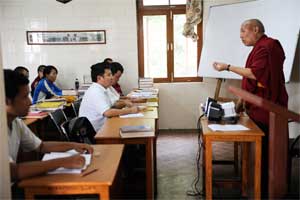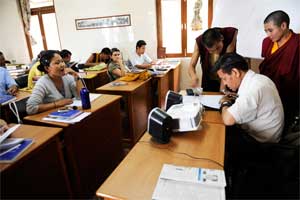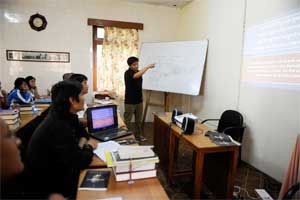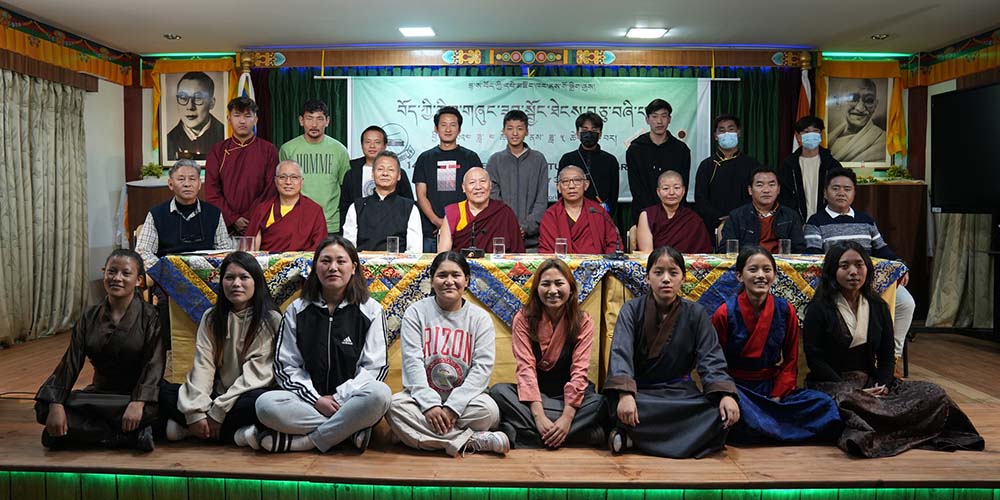 Each year, a variety of specially designed workshops and seminars are given for a variety of topics related to science and Tibetan culture.
Each year, a variety of specially designed workshops and seminars are given for a variety of topics related to science and Tibetan culture.
The LTWA organizes two yearly intensive learning programs. A three-month Intensive Translation Program (ITP) was started in 2006 and a two-month Intensive Tibetan Studies Program was started in 2009. The ITP is from July 1 to September 30. Approximately thirty students are admitted to each program. The programs are open to Tibetans and others from the Himalayan regions and foreigners who have a good command of the Tibetan language.
In the Intensive Tibetan Studies Program, students are taught Tibetan language and literature, Buddhist philosophy and practice, and Tibetan history. In the ITP students are taught Tibetan language and literature, Buddhist philosophy and practice, English language and literature, and translation methodology.
This year the Library of Tibetan Works and Archives (LTWA), Dharamsala, is organizing its fourteenth ITP from 1st July to 30th September. The ITP will exclusively cover the various methods and practices adopted in the translation, especially Buddhist teachings.
HISTORICAL BACKGROUND
 Through the ages, translation (a simple yet complicated process of rendering a piece of information from its language of origin so that it may be expressed within a different culture) has proven the greatest force behind constructive interaction among humankind. Translation has enabled the sharing and exchanging of knowledge on religion, culture, science, technology, education, tradition, arts and so forth among people of different cultural and environmental backgrounds. For the Tibetans, translation ushered in a golden era as it facilitated the advent of Buddhism in Tibet from India in the late seventh century.
Through the ages, translation (a simple yet complicated process of rendering a piece of information from its language of origin so that it may be expressed within a different culture) has proven the greatest force behind constructive interaction among humankind. Translation has enabled the sharing and exchanging of knowledge on religion, culture, science, technology, education, tradition, arts and so forth among people of different cultural and environmental backgrounds. For the Tibetans, translation ushered in a golden era as it facilitated the advent of Buddhism in Tibet from India in the late seventh century.
Today, Tibet’s identity is largely characterized by the principles and values enshrined in the innumerable ancient Buddhist scriptures that have been translated from the languages of India and other countries. Though its history is brief compared to other ancient countries, Tibet has witnessed one of the highest rates of Buddhist translation in the world, both in quality and quantity. The quality of translation works by the great savants motivated solely by the intention to benefit others continued for hundreds of years under the patronage of the Tibetan kings and the successive rulers.
The Chinese invasion and its occupation of Tibet in 1959 resulted in the mass killing of Tibetans, including monks and nuns, and vast destruction of temples and monasteries. The infamous decade-long Chinese “Cultural Revolution” (1966―1977) and the subsequent repressive policies instituted by the Chinese government further intensified religious and cultural persecution, ravaging much of the priceless Tibetan literary, religious and cultural wealth. The illegal occupation forced Tibet’s spiritual and temporal leader, His Holiness the Dalai Lama, and thousands of Tibetans to flee into exile and seek asylum in India and elsewhere.
Today, despite all adversity, His Holiness the Dalai Lama and the Central Tibetan Administration (CTA), with generous support from India and other countries, have taken tremendous strides towards rebuilding the ancient monasteries and cultural institutions and opening new schools for the teaching of modern subjects. This effort has led to the establishment of many cultural centers, including one of the oldest: the Library of Tibetan Works and Archives in Dharamsala in the north of India.
Founded in 1971, the LTWA was formally recognized as a “Centre for Tibetan Studies” by the Himachal Pradesh University. With an extensive library facility aided by several other departments, the LTWA functions as an academic centre for Buddhist and Tibetan studies.
AIMS AND OBJECTIVES
In the ongoing struggle for Tibet’s freedom, Tibetans stand face to face with two major challenges: firstly, to sustain their unique identity through the preservation of their distinct culture and religion, and secondly to begin to embrace modern science and technology and seek to excel in these areas for the betterment of Tibet and the world. In view of these challenges, His Holiness the Dalai Lama and the CTA have worked tirelessly towards the rebuilding of monasteries and centers for cultural education, and the opening of new schools for teaching modern subjects.
These two challenges further spur the need for translations to enable both the dissemination of Tibet’s ancient spiritual culture to the materialistically advanced West and the assimilation of Western knowledge of modern science and technology to further Tibetans’ spiritual richness. This imperative could well yield an unprecedented growth of literary works to add to the already vast Tibetan literary collections, and will significantly help to ensure the intellectual growth of a nation. In light of these pressing needs, the LTWA has been organizing its annual ITP for the last eighteen years.
PROGRAM DESCRIPTION
 The program is conducted for a period of three months from 1st July to 30th September. However, classes will not be held on Sundays, and on the second, third, and fourth Saturdays of each month, as well as Tibetan national holidays and during His Holiness’ teachings in Dharamsala. Students are required to attend a minimum of 80% of classes.
The program is conducted for a period of three months from 1st July to 30th September. However, classes will not be held on Sundays, and on the second, third, and fourth Saturdays of each month, as well as Tibetan national holidays and during His Holiness’ teachings in Dharamsala. Students are required to attend a minimum of 80% of classes.
Throughout the period, the ITP will primarily focus on four subjects: Buddhist philosophy and practice, Tibetan language, English language and translation methodology and practice. On each working day there will be four or five classes of 60–90 minutes.
At times, extra classes will be conducted to provide students with direct interaction with scholars. Whenever possible, the LTWA will also invite experienced translators, scholars, Tibetan parliament members and the experienced CTA staff members to speak on different topics. Students can also attend scholarly talks organized by the LTWA for the general public.
At times, extra classes will be conducted to provide students with direct interaction with scholars. Whenever possible, the LTWA will also invite experienced translators, scholars, Tibetan parliament members and the experienced CTA staff members to speak on different topics. Students can also attend scholarly talks organized by the LTWA for the general public.
The LTWA will entrust students with translation tasks during the training program such as translating religious and secular texts from Tibetan to English and vice-versa. Translated works may be published by the LTWA.
FORMAL CERTIFICATION
On completion of the program, the LTWA will confer upon students a certificate stating that they have successfully completed the Intensive Translation Program 2016. Only those attending a minimum of 80% of the total working classes will be entitled to receive a certificate. Should a student fail to fulfill the minimum attendance requirement, no reasons—medical or otherwise—shall be entertained for the issuance of any certificate.
FOOD AND ACCOMMODATION
Each of the students selected under the scholarship awardee quota will be granted a monthly stipend of 5,000 (Rupees five thousand rupees) in lieu of accommodation and food allowance during the program. However, those who get rooms at the LTWA will not get stipend for the accommodation.
No fee will be charged to students for any class or extra-curricular activity that the LTWA might conduct during the program.
DISCIPLINARY NOTES
In the event of any dispute relating to the program, the LTWA reserves the sole right to make decisions or to entrust such cases to the appropriate bodies. The LTWA also reserves the right to terminate the program for any significantly viable reason or suspend a student for any improper action or behavior.
 Library of Tibetan Works and Archives
Library of Tibetan Works and Archives


